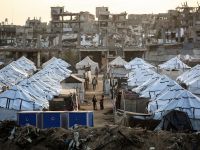Peru's future president Alejandro Toledo called for national reconciliation and international support, as results out early Monday showed he defeated his electoral rival for the top job by only a few points.
Toledo, a US-educated economist of humble Andean Indian origins, celebrated his victory as a triumph of democracy and the start of a new, stronger Peru.
Vote counting continued early Monday, but with 80 percent of the ballots counted Toledo had garnered about 52 percent of the vote, just over four points ahead of Alan Garcia, an unlikely comeback candidate once blamed for wrecking the South American country's economy.
Peruvians heaved a sigh of relief as Garcia rapidly conceded defeat and shook hands with the future leader, a gesture heavy with symbolism after the political turbulence that rocked the country since now deposed president Alberto Fujimori won a controversial third-term in May 2000 elections.
Toledo said it was time for Peru to move on, to kickstart its immobilized economy, to provide badly needed jobs, and to strengthen its fledgling democracy.
He announced he would head out on an international tour before assuming the presidency on July 28, in a bid to find fresh investments and discuss Peru's foreign debt.
"We hope to attract capitals for investment to ensure the economy grows and generates employment," he said.
"We will look at a proportion of the foreign debt -- there is a proportion of about 20 percent of foreign debt that is negotiable," he said.
Evidently seeking to reassure investors worried by his reputation as a firebrand populist -- despite a stint as a World Bank consultant -- Toledo stressed his determination to keep a tight rein on domestic spending and to maintain strict fiscal and monetary discipline.
Speaking to cheering supporters in a central Lima square, Toledo urged Peruvians to join hands in rebuilding the country after what he said were 10 years of "corrupt dictatorship" under Fujimori.
Despite radically different styles, Toledo and Garcia campaigned on similar platforms of job creation, social improvements and democratic reforms.
A first step for the next president is certain to be the search for political allies. While Toledo's Peru Posible became the strongest party in the unicameral Congress after the April 8 elections, it fell short of an absolute majority, with 45 of the 120 mandates.
Toledo had already run for president in 1995 when he ended fourth, and last year, when he was again defeated by Fujimori.
Toledo's pronounced indigenous features and his humble background -- he once worked as a shoeshine boy -- have helped him gain a fervent grass-roots following.
He also gained support for organizing mass protests after losing to Fujimori in last year's elections widely decried as fraught with irregularities.
But he also has been dogged by claims that he misused campaign funds, held a cocaine and sex party with three prostitutes, and refused to recognize a daughter he is said to have fathered out of wedlock.
On the other hand, many Peruvians remember the long lines outside food stores, the four-digit hyperinflation and the human rights abuses that marked the 1985-1990 Garcia administration. Garcia only returned from nine years of self-imposed exile in January after charges of corruption lapsed.
Toledo will take over from Valentin Paniagua, who has acted as interim president since Fujimori was ousted at the height of a cash-for-favors scandal in November – LIMA (AFP)
© 2001 Al Bawaba (www.albawaba.com)







